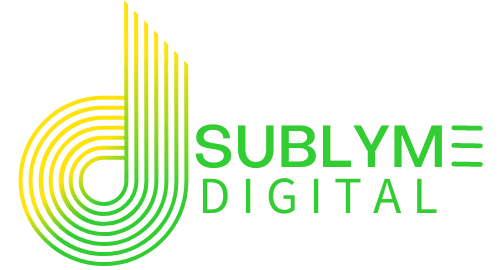
Author: Graham Davidson
Graham Davidson is the Owner and Chief Marketing Guru of Sublyme Digital, leading the agency’s remote-first approach to deliver impactful web design, SEO, and digital growth strategies for businesses across North America.
Why You Shouldn’t Optimize Every Page for AI: Our Hero Topic Theory
Key Takeaways:
- Hero topics are the cornerstone of modern SEO and AI visibility
- Deep optimization should be reserved for your most valuable topics
- Secondary topics play a supporting role but don’t require heavy investment
- AI, LLMs, and zero-click trends demand a smarter allocation of SEO resources
- This approach is actionable, measurable, and future-proof
The Evolution of Search—Blue Links to AI Answers
Search engines have always been in flux, but the past two years have brought a seismic shift. The introduction of AI search features, like Google’s Search Generative Experience (SGE), Bing’s AI-powered answers, and the explosion of answer engines, has fundamentally changed how users interact with search results.
No longer do users need to click ten blue links to piece together information. Today, they’re served instant answers, summaries, and recommendations—often without ever leaving the search engine. This “zero-click” phenomenon is now the norm for a huge portion of queries, especially those seeking quick facts, definitions, or simple solutions.
The Problem With Optimizing Everything
It’s tempting to believe that more is always better when it comes to SEO. More optimized pages, more keywords, more schema, more chances to win a snippet or a citation. But as AI and zero-click trends continue to accelerate, the returns on this approach are quickly diminishing.
The reality is that many secondary or low-value topics are now “owned” by AI answer engines. When users search for generic how-tos, definitions, or stats, they’re increasingly served an AI-generated answer—often sourced from multiple sites, with little incentive to click through.
For brands, this means pouring resources into optimizing every single page for AI is not just inefficient—it can dilute your authority and ROI. Pages that historically drove little traffic or conversions are now even less likely to deliver value, as they’re cannibalized by AI snippets and zero-click results.
The Hero Topic Theory—A Smarter, More Sustainable Approach
Optimizing every page for AI isn’t just unnecessary—it can actually dilute your results. Focus on your hero topics for maximum impact.

How to Identify Your Hero Topics
Identifying hero topics starts with a clear understanding of your business goals and your audience’s needs. Begin by mapping your customer journey—what questions do prospects ask at each stage, from awareness to decision? Which topics come up repeatedly in sales calls, support requests, or online reviews?
Next, turn to your data. Analyze your website analytics to see which pages drive the most valuable traffic—measured not just in visits, but in conversions, leads, and revenue. Look at your top-performing keywords in Google Search Console. Use competitor research tools to see where you have an edge, and where there’s room to grow.
Deep Optimization for Hero Topics
Once you’ve identified your hero topics, it’s time to invest in deep optimization. This goes beyond basic on-page SEO. It means creating comprehensive, authoritative content that answers every facet of the user’s query—and then some.
Start with content depth. Your hero topic pages should be the definitive resource in your niche, offering unique insights, original research, and actionable takeaways. Update these pages regularly to keep them fresh and competitive.
Implement advanced structured data. Use schema.org markup, FAQ sections, and HowTo schemas to make your content machine-readable and snippet-friendly. This investment of time and schema increases your chances of being cited in AI-generated answers and featured snippets.
Optimize for LLMs and answer engines. Write in a clear, concise style that’s easy for large language models to parse and cite. Use pull quotes, stats, and summarized answers that AI systems can easily extract. Consider adding a “TL;DR” or key takeaway section at the top of longer pages.
Invest in multimedia. Include custom graphics, professional cartoon-style images, and videos to enhance user engagement and provide additional context for AI systems.
Make hero topics central to your internal linking strategy. These pages should be hubs, connected to related content throughout your site, reinforcing their authority and importance.
The Role of Secondary Topics in Modern SEO
Just because a topic isn’t a hero doesn’t mean it’s irrelevant. Secondary topics still play an important role in supporting your site’s topical authority and breadth. They help you cover the full spectrum of your niche, provide internal linking opportunities, and ensure your site is seen as a comprehensive resource.
However, the approach to secondary topics should be different. Focus on SEO fundamentals—clear structure, crawlability, and internal links—but don’t overinvest in deep optimization. Instead, make these pages LLM-friendly by providing concise, accurate information that can be easily cited by AI engines.
FAQs:
Answer: Hero topics are the core subjects that drive the most value for your brand—think of them as the backbone of your content strategy. These are the pages you should invest in deeply for AI, LLM, and user visibility.
Answer: Optimizing every page for AI and snippets can dilute your efforts and ROI, especially as zero-click searches rise. Focusing on hero topics ensures your resources deliver the greatest impact.
Answer: Look at business value, audience needs, analytics, and competitive gaps. Prioritize the topics that align with your goals and have the highest potential for authority and conversions.
Answer: Zero-click searches mean users get answers directly in the SERP, often without visiting your site. This trend is strongest for generic or low-value topics, making it crucial to focus on high-value content.
Answer: Write clear, concise answers, use structured data, and provide unique insights. Make your content easy for AI and language models to understand and cite.
Success Stories
365 Data Centers
Discover how we rapidly rebuilt and optimized a 30-page website for 365 Data Centers, restoring their online presence and managing digital ad campaigns across key regions to drive engagement and growth.
XTECH Football Pads
Discover how we transformed XTECH Football Pads‘ digital presence, boosting their online sales and tripling website traffic through innovative website development and user experience enhancements.
BeEarth Foundation
Discover how we partnered with the BeEarth Foundation to develop a website that aligns with their mission of sustainability and global engagement. Our work has significantly increased their online visibility and engagement, supporting their efforts to promote sustainable development.
We Recycle Solar
Learn how we illuminated digital success for We Recycle Solar by completely redesigning their website to reflect their leadership in the growing solar recycling industry and implementing strategic digital advertising campaigns that enhanced their visibility at key industry events.
Preferred Home Health Care & Nursing Services
Explore how we elevated the digital presence of Preferred Home Health Care & Nursing Services by enhancing their website for better lead generation, building a dedicated site for staff recognition, and optimizing SEO for their location pages.
What Our Clients Say: Elevating Online Success
We Build Cool
The ROI of Focusing on Hero Topics
The hero topic approach is not just a theory—it’s a proven strategy for maximizing ROI in a world of AI and zero-click search. By concentrating your resources on the topics that matter most, you drive more qualified traffic, earn more conversions, and build lasting brand authority.
This strategy also future-proofs your SEO. As AI engines become more sophisticated, they will increasingly rely on authoritative sources for their answers. By owning your hero topics, you position your brand as the go-to expert—both for users and for the machines that now shape discovery.
How to Put the Hero Topic Theory Into Practice
Putting the hero topic theory into practice starts with a shift in mindset. Move away from the idea that every page deserves equal attention, and embrace the power of strategic focus.
Begin with a content audit. Identify your current hero topics, evaluate their performance, and look for gaps or opportunities to optimize or expand on these topics. Develop a content calendar that prioritizes deep optimization for these pages, while maintaining a baseline of quality for secondary topics.
Engage your team in ongoing education. Make sure everyone understands the why behind the hero topic approach, and empower them to contribute ideas and insights.
Use analytics to guide your efforts. Set clear KPIs for your hero topics—traffic, conversions, AI mentions, and more—and review them regularly. Be ready to pivot as new opportunities emerge.
Finally, communicate the value of this approach to stakeholders. Show them how focusing on hero topics delivers stronger results, higher ROI, and a more sustainable path to growth.
Final Thoughts
Let's Build Something Sublyme
Ready to make your SEO smarter, more efficient, and future-proof? Contact Sublyme Digital to audit your content and build a hero-topic strategy that works for the AI era.



